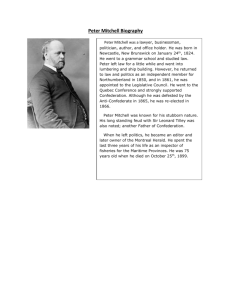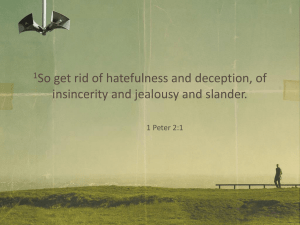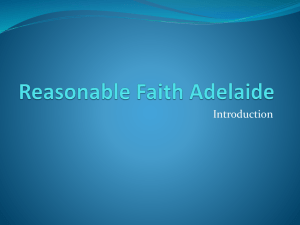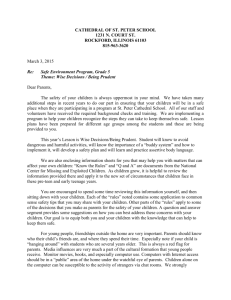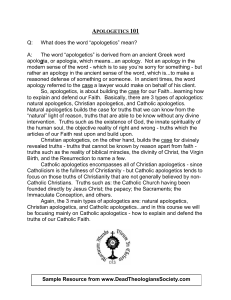Grace Community Church Sunday School Confident Faith: Hope in
advertisement
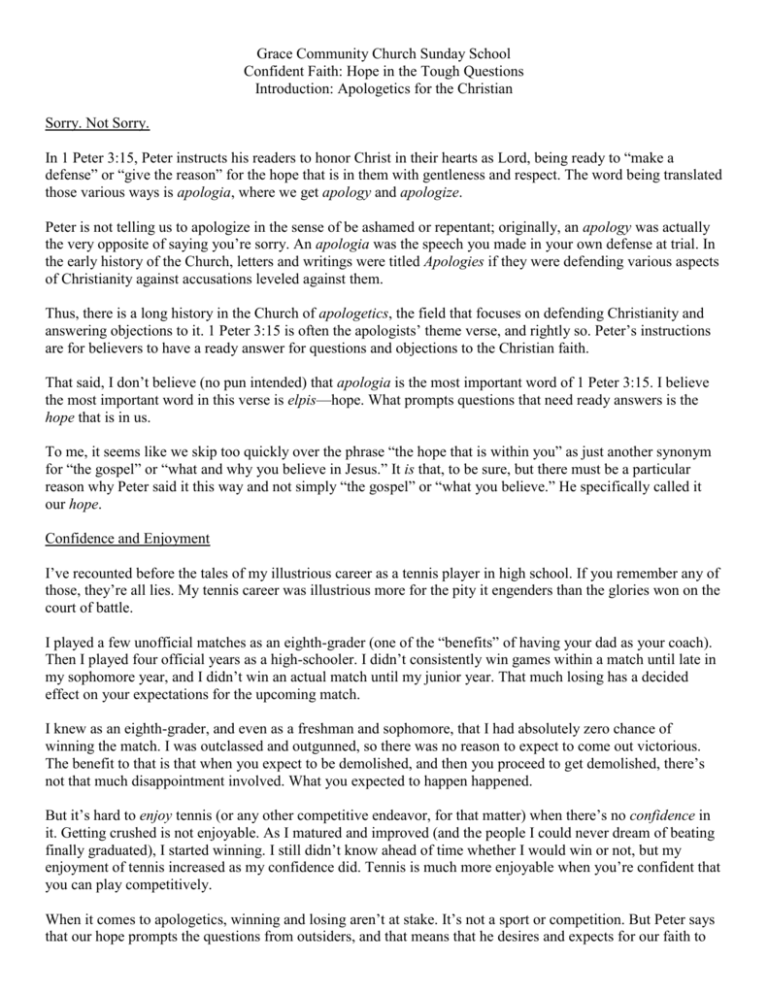
Grace Community Church Sunday School Confident Faith: Hope in the Tough Questions Introduction: Apologetics for the Christian Sorry. Not Sorry. In 1 Peter 3:15, Peter instructs his readers to honor Christ in their hearts as Lord, being ready to “make a defense” or “give the reason” for the hope that is in them with gentleness and respect. The word being translated those various ways is apologia, where we get apology and apologize. Peter is not telling us to apologize in the sense of be ashamed or repentant; originally, an apology was actually the very opposite of saying you’re sorry. An apologia was the speech you made in your own defense at trial. In the early history of the Church, letters and writings were titled Apologies if they were defending various aspects of Christianity against accusations leveled against them. Thus, there is a long history in the Church of apologetics, the field that focuses on defending Christianity and answering objections to it. 1 Peter 3:15 is often the apologists’ theme verse, and rightly so. Peter’s instructions are for believers to have a ready answer for questions and objections to the Christian faith. That said, I don’t believe (no pun intended) that apologia is the most important word of 1 Peter 3:15. I believe the most important word in this verse is elpis—hope. What prompts questions that need ready answers is the hope that is in us. To me, it seems like we skip too quickly over the phrase “the hope that is within you” as just another synonym for “the gospel” or “what and why you believe in Jesus.” It is that, to be sure, but there must be a particular reason why Peter said it this way and not simply “the gospel” or “what you believe.” He specifically called it our hope. Confidence and Enjoyment I’ve recounted before the tales of my illustrious career as a tennis player in high school. If you remember any of those, they’re all lies. My tennis career was illustrious more for the pity it engenders than the glories won on the court of battle. I played a few unofficial matches as an eighth-grader (one of the “benefits” of having your dad as your coach). Then I played four official years as a high-schooler. I didn’t consistently win games within a match until late in my sophomore year, and I didn’t win an actual match until my junior year. That much losing has a decided effect on your expectations for the upcoming match. I knew as an eighth-grader, and even as a freshman and sophomore, that I had absolutely zero chance of winning the match. I was outclassed and outgunned, so there was no reason to expect to come out victorious. The benefit to that is that when you expect to be demolished, and then you proceed to get demolished, there’s not that much disappointment involved. What you expected to happen happened. But it’s hard to enjoy tennis (or any other competitive endeavor, for that matter) when there’s no confidence in it. Getting crushed is not enjoyable. As I matured and improved (and the people I could never dream of beating finally graduated), I started winning. I still didn’t know ahead of time whether I would win or not, but my enjoyment of tennis increased as my confidence did. Tennis is much more enjoyable when you’re confident that you can play competitively. When it comes to apologetics, winning and losing aren’t at stake. It’s not a sport or competition. But Peter says that our hope prompts the questions from outsiders, and that means that he desires and expects for our faith to have a similar kind of enjoyment-confidence relationship. Peter doesn’t expect everyone to give doctoral dissertations in every apologetic or evangelistic conversation; in fact, that’s probably the worst thing you could do! What Peter is after is for people who are confident in their faith because they have tasted and seen that the Lord is good, not confident in winning debates or having all the theologically astute answers. One statement from RUF Summer Conference, in a seminar on apologetics, has stayed with me ever since: “There is no such thing as an airtight argument. There are only airtight people.” There are no foolproof, guaranteed arguments that will always convince everyone every time. Think about what the exodus generation witnessed firsthand: Ten plagues The Red Sea crossing The Pillar (cloud and fire) Manna Quail Water fountains made out of rock Never-worn-out clothes and shoes Shekinah glory in the midst of the camp And they did not believe. Think about how many people personally witnessed Jesus Christ and turned away. Thus, in this class, our purpose is not to figure out how to “win” against outsiders. There is no “winning” or “losing.” But there is not only faithfulness but hope. This hope is what Peter earlier referred to as having “tasted and seen that the Lord is good” (2:3), an allusion to Psalm 34:8. The difficult questions raised in apologetics can sometimes be like a sinus congestion or infection—your nose gets so stopped up that you can’t taste anything. Everything is bland, and nothing is good anymore. My prayer and goal for this series is that we take on the hard questions of the Bible and theology and apologetics, specifically to re-taste God’s goodness in them. Our aim is the enjoyment that comes from confidence, even in the midst of uncertainty. Or, as Paul would put it, “walking by faith.”

